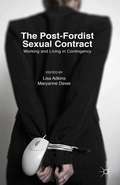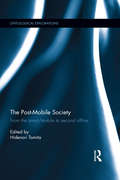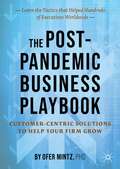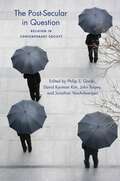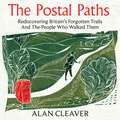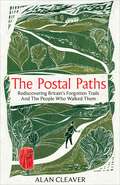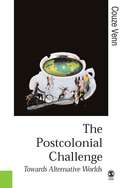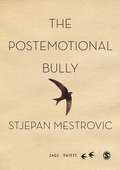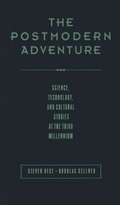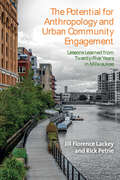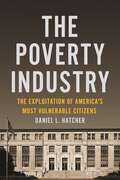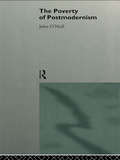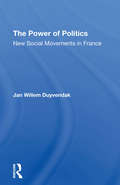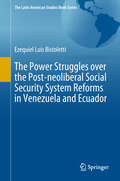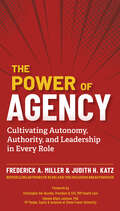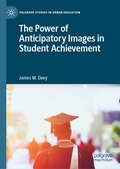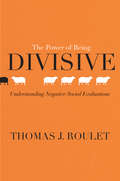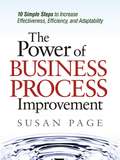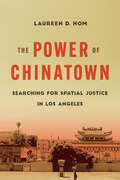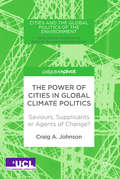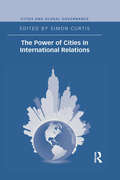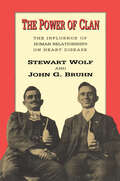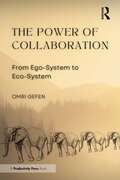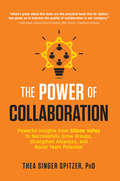- Table View
- List View
The Post-Fordist Sexual Contract: Working and Living in Contingency
by Lisa Adkins Maryanne DeverThis collection analyzes shifting relationships between gender and labour in post-Fordist times. Contingency creates a sexual contract in which attachments to work, mothering, entrepreneurship and investor subjectivity are the new regulatory ideals for women over a range of working arrangements, and across classed and raced dimensions.
The Post-Mobile Society: From the Smart/Mobile to Second Offline
by Hidenori TomitaWith the spread of mobile augmented reality, it has become very difficult to consider digital space and physical space independently. In this book, the authors identify and discuss the state 'Second Offline' which refers to a real-world environment whose elements are augmented by virtual information and one in which individuals are constantly referring to the online world. ‘Second Offline’ is observed across a wide range of social contexts and the relationship between superimposed digital online information and physical offline information is increasingly important. This book analyses the cooperative relationship between online and offline and also examines situations where there may be a conflict between these realities. Furthermore, the authors discuss the possibility that in addition to influencing the physical space, the digital world actually causes some of the physical world to be lost. Offering a discussion of the implications of a post-mobile society in which second offline is widespread, this edited collection will be of interest to students, scholars and practitioners working in sociology, mobile media and cultural studies more generally.
The Post-Pandemic Business Playbook: Customer-Centric Solutions to Help Your Firm Grow
by Ofer MintzCOVID-19 forced a dramatic change to customer behavior that resulted in an economic crisis not witnessed by anyone alive. Businesses can no longer operate as before because their customers are no longer operating as before. This book provides customer-centric based guidance for how businesses should adapt to this new reality, deriving insights from academic research, case studies, interviews, and best practice examples from around the world. As validated by hundreds of top-level executives, its readers will gain a better understanding of why customer behavior has changed so they can use the book’s solutions to navigate through and succeed in the post COVID-19 future.
The Post-Secular in Question: Religion in Contemporary Society (Social Science Research Council #7)
by John Torpey David Kyuman Kim Philip S. Gorski Jonathan VanAntwerpenThe Post-Secular in Question considers whether there has in fact been a religious resurgence of global dimensions in recent decades. This collection of original essays by leading academics represents an interdisciplinary intervention in the continuing and ever-transforming discussion of the role of religion and secularism in today’s world. Foregrounding the most urgent and compelling questions raised by the place of religion in the social sciences, past and present, The Post-Secular in Question restores religion to a more central place in social scientific thinking about the world, helping to move scholarship “beyond unbelief.” Contributors: Courtney Bender, Craig Calhoun, Michele Dillon, Philip S. Gorski, Richard Madsen, Kathleen Mahoney, Tomoko Masuzawa, Eduardo Mendieta, John Schmalzbauer, James K. A. Smith, John Torpey, Bryan S. Turner, Hent de Vries.
The Postal Paths: Rediscovering Britain’s Forgotten Trails And The People Who Walked Them
by Alan Cleaver'A fascinating exploration of routes trod by generations of rural postmen and women - lovingly told and lively.'-JACK CORNISH, author of The Lost Paths'A delightful exploration of one of our most important cultural figures in the community, the postman. Postal Paths journeys around the UK, unearthing forgotten stories... You will never look at a postman in the same way again.' -REBECCA SMITH, author of Rural: The Lives of the Working Class Countryside'Charming... Cleaver brings to the life the lives of those who served their communities.'-KIRAN SIDHU, author of I Can Hear The Cuckoo***Seeing the hills, the crofts, villages and ruins only tells half the story. The people who worked, walked, lived and died here are the other half.Postal paths span the length and breadth of Britain - from the furthermost corners of the Outer Hebrides to the isolated communities clinging to the cliffs of the Rame Peninsula in south-east Cornwall. For over 200 years, postmen and women have delivered post to homes across Britain on foot, no matter how remote.A chance remark by a farmer about a Postman's Path led Alan Cleaver on a quest to discover more about this network of lanes, short-cuts and footpaths in the British landscape. From the rolling fells of Cumbria to Kent's shingle coast, he walked in the footsteps of 20th Century posties. And what he found, through conversation and painstaking research, was not just beautiful scenery. It was an incredible, forgotten slice of social history - the tales and toil of rural postmen and women trudging down lanes, over fields, and even across rivers to make sure the post always came on time.From women like Hannah Knowles, who began her job delivering letters in 1912 and would only miss three days through illness over the next 62 years of service, to a WW1 veteran who completed his 9-mile delivery route on one leg, Postal Paths paints a vivid picture of people who not only served communities but brought them together, one letter at a time.
The Postal Paths: Rediscovering Britain’s Forgotten Trails And The People Who Walked Them
by Alan Cleaver'A fascinating exploration of routes trod by generations of rural postmen and women - lovingly told and lively.'-JACK CORNISH, author of The Lost Paths'A delightful exploration of one of our most important cultural figures in the community, the postman. Postal Paths journeys around the UK, unearthing forgotten stories... You will never look at a postman in the same way again.' -REBECCA SMITH, author of Rural: The Lives of the Working Class Countryside'Charming... Cleaver brings to the life the lives of those who served their communities.'-KIRAN SIDHU, author of I Can Hear The Cuckoo***Seeing the hills, the crofts, villages and ruins only tells half the story. The people who worked, walked, lived and died here are the other half.Postal paths span the length and breadth of Britain - from the furthermost corners of the Outer Hebrides to the isolated communities clinging to the cliffs of the Rame Peninsula in south-east Cornwall. For over 200 years, postmen and women have delivered post to homes across Britain on foot, no matter how remote.A chance remark by a farmer about a Postman's Path led Alan Cleaver on a quest to discover more about this network of lanes, short-cuts and footpaths in the British landscape. From the rolling fells of Cumbria to Kent's shingle coast, he walked in the footsteps of 20th Century posties. And what he found, through conversation and painstaking research, was not just beautiful scenery. It was an incredible, forgotten slice of social history - the tales and toil of rural postmen and women trudging down lanes, over fields, and even across rivers to make sure the post always came on time.From women like Hannah Knowles, who began her job delivering letters in 1912 and would only miss three days through illness over the next 62 years of service, to a WW1 veteran who completed his 9-mile delivery route on one leg, Postal Paths paints a vivid picture of people who not only served communities but brought them together, one letter at a time.
The Postcolonial Challenge: Towards Alternative Worlds (Published in association with Theory, Culture & Society)
by Couze Venn"An outstanding contribution to our understanding of postcolonial theory and its engagement with significant changes within the contemporary world. Couze Venn forces us to rethink the very parameters of the post-colonial and suggests a new political economy for post-modern times. This critical engagement opens up the possibility to reimagine the world from its current narrow European strictures to a world full of alternative possibilities and modernities... This is a timely and ground breaking book that contributes to a much needed reconceptualisation of the postcolony". - Professor Pal Ahluwalia, Goldsmiths, University of London What is postcolonial studies? What are its achievements, strengths and weaknesses? This ground breaking book offers an essential guide to one of the most important issues of our time, with special emphasis on neo-liberalism within world poverty and the 'third world'. It clarifies: The territory of postcolonial studies How identity and postcolonialism relate The ties between postcolonialism and modernity New perspectives in the light of recent geo-political events Potential future developments in the subject.
The Postemotional Bully (SAGE Swifts)
by Stjepan MestrovicThe topics of bullying and hazing have sparked interest and discussion in recent years. Hazing is a crime in the United States, and Western nations have made efforts to stamp out bullying in schools, the workplace, and institutions. However, for the most part, bullying and hazing are ill-defined and lack theoretical perspective. Mestrovic brings classical as well as contemporary social theory to bear on this discussion. Thorstein Veblen defined the predatory barbarian as the social type, enshrined by modernity, who prefers to use force over peacable means to achieve ends. On the other extreme, Marcel Mauss wrote about the spirit of the gift and its obligations - to give, to receive, and to reciprocate - as the fundamental basis of social life. Yet, he argued that the spirit of modernity was disappearing with the progress of modernity. Mestrovic traces this fundamental opposition between barbaric force or bullying versus benign obligation that is the spirit of the gift through a host of modernist and postmodernist thinkers and theories. He introduces the concept of the 'postemotional bully' as an alternative to both of these major bodies of social theory. The postemotional bully, as a social type, is fungible, beset by screen-images on media and social media that are isolating, and is at the mercy of the peer-group. Case studies focus on bullying and hazing, specifically the cases of an American solider who committed suicide in Afghanistan, instances of torture at Abu Ghraib, and the murder of a 23-year-old African-American inmate in a Southern state prison in the US.
The Postemotional Bully (SAGE Swifts)
by Stjepan MestrovicThe topics of bullying and hazing have sparked interest and discussion in recent years. Hazing is a crime in the United States, and Western nations have made efforts to stamp out bullying in schools, the workplace, and institutions. However, for the most part, bullying and hazing are ill-defined and lack theoretical perspective. Mestrovic brings classical as well as contemporary social theory to bear on this discussion. Thorstein Veblen defined the predatory barbarian as the social type, enshrined by modernity, who prefers to use force over peacable means to achieve ends. On the other extreme, Marcel Mauss wrote about the spirit of the gift and its obligations - to give, to receive, and to reciprocate - as the fundamental basis of social life. Yet, he argued that the spirit of modernity was disappearing with the progress of modernity. Mestrovic traces this fundamental opposition between barbaric force or bullying versus benign obligation that is the spirit of the gift through a host of modernist and postmodernist thinkers and theories. He introduces the concept of the ′postemotional bully′ as an alternative to both of these major bodies of social theory. The postemotional bully, as a social type, is fungible, beset by screen-images on media and social media that are isolating, and is at the mercy of the peer-group. Case studies focus on bullying and hazing, specifically the cases of an American solider who committed suicide in Afghanistan, instances of torture at Abu Ghraib, and the murder of a 23-year-old African-American inmate in a Southern state prison in the US.
The Postmodern Adventure: Science Technology and Cultural Studies at the Third Millennium
by Douglas Kellner Steven BestThis compelling book explores the challenges to theory, politics, and human identity that we face on the threshold of the third millennium. It follows on the successor of Best and Kellner's two previous books, Postmodern Theory, acclaimed as the best critical introduction to the field - and The Postmodern Turn, which provides a powerful mapping of postmodern developments developments in the arts, politics, science, and theory. In The Postmodern Adventure, Best and Kellner analyze a broad array of literary, cultural, and political phenomena from fiction, film, science, and the Internet, to globalization and the rise of a transnational image culture.
The Potential for Anthropology and Urban Community Engagement: Lessons Learned from Twenty-Five Years in Milwaukee
by Jill Florence Lackey Rick PetrieThe relationship between anthropology departments and their surrounding urban communities has been traditional limited by a number of factors. The Potential for Anthropology and Urban Community Engagement pushes past these limitations, developing a firm foundation from which applied anthropology can support grassroots research and lasting community programs. Using two partnering Milwaukee organizations as examples, this volume explores the need in urban neighborhoods for practicing anthropologists, how a high volume of asset-building programs can be developed by practicing anthropologists, and the potential efficacy of anthropology departments in partnering with urban neighborhoods.
The Poverty Industry: The Exploitation of America's Most Vulnerable Citizens (Families, Law, and Society #11)
by Daniel L HatcherHow funds for the needy are siphoned off for profit: &“A distressing picture of how states routinely defraud taxpayers of millions of federal dollars.&” ―Boston Review Government aid doesn&’t always go where it&’s supposed to. Foster care agencies team up with companies to take disability and survivor benefits from abused and neglected children. States and their revenue consultants use illusory schemes to siphon Medicaid funds intended for children and the poor into general state coffers. Child support payments for foster children and families on public assistance are converted into government revenue. And the poverty industry keeps expanding, leaving us with nursing homes and juvenile detention centers that sedate residents to reduce costs and maximize profit, local governments buying nursing homes to take the facilities&’ federal aid while the elderly languish with poor care, and counties hiring companies to mine the poor for additional funds in modern day debtor&’s prisons. In The Poverty Industry, Daniel L. Hatcher shows us how state governments and their private-industry partners are profiting from the social safety net, turning America&’s most vulnerable populations into sources of revenue and stealing billions. As policy experts across the political spectrum debate how to best structure government assistance programs, a massive siphoning of the safety net is occurring behind the scenes. In the face of these abuses of power, Hatcher offers a road map for reforms to realign the practices of human service agencies with their intended purpose, to prevent the misuse of taxpayer dollars—and ensure that aid truly reaches those in need. &“Meticulously researched . . . lifts the lid on a system that rather than helping the needy, systematically turns them into &‘a source of revenue.&’&” ―The Guardian &“Walks through the evolution of legal doctrine regarding rights of vulnerable persons [and] provides compelling evidence that scholars, policymakers, and advocates should take a closer look at the political and business relationships shaping contracting decisions involving for-profit firms.&” ―Political Science Quarterly
The Poverty of Postmodernism (Social Futures)
by John O'NeillThe Poverty of Postmodernism rejects the current celebration of knowledge and value relativism. This is on the grounds that it renders critical reason and commonsense incapable of resisting the superifical ideologies of minoritarianism that leave the hard core of global capitalism unanalyzed. In this book John O'Neill examines the postmodern turn in the social sciences. From a phenomenological standpoint (Husserl, Merleau Ponty, Schutz, Winch), he challenges Lyotard's postrationalist reading of Wittgenstein and Habermas in order to defend commonsense reason and values that are constitutive of the everyday life-world. In addition he argues from the standpoint of Vico and Marx on the civil history of embodied mind that the post-rationalist celebration of the arts of superificiality undermines the recognition of the cultural debt each generation owes to past and post-generations. In a positive way O'Neill develops an account of the historical vocation of reason and of the charitable accountability of science to commonsense that is necessary to sustain the basic institutions of civic democracy.
The Power Of Politics: New Social Movements In France
by Jan Willem DuyvendakIn the turbulent years of the 1960s and 1970s, France, like other European countries and the United States, was rocked by a new wave of social movements. The early development of a strong antinuclear movement during the 1970s made France the prototypical country for new social movements (NSMs). However, in the 1980s, these French NSMs experienced a strong decline. In this book, Jan Willem Duyvendak compares the surprising development of these NSMs in France—for peace, the environment, an end to nuclear technology, solidarity, squatters' rights, women's rights, and gay rights—to the development of similar campaigns in Germany, Switzerland, and the Netherlands. Although all of these countries share more or less the same economic characteristics, they have different political traditions. Duyvendak finds that by the 1980s, the new social movements were weaker in France because of France's tradition of "old" political conflicts. He concludes that because France was still beset with political splits between center periphery and urban-country as well as religious and class strife, the development of French society during the 1980s took place at the expense of these new social movements
The Power Struggles over the Post-neoliberal Social Security System Reforms in Venezuela and Ecuador (The Latin American Studies Book Series)
by Ezequiel Luis BistolettiThis book carries out a comparative analysis of the power struggles over the post-neoliberal social security reforms in Venezuela and Ecuador. The research breaks down why the social security system reform initiated by Hugo Chávez’ government in Venezuela has come down since its passing in 2002, whereas the social security system reform initiated by Rafael Correa’s government in Ecuador has come along in spite of the obstacles since 2007. All in all, the analysis determined that the struggles over the social security system reforms in both countries remarkably corresponded to each other with regard to their structural conditions, points of contention, and contending actors. In contrast, the analysis established substantial divergences regarding the ways in which the struggles over both reforms came about, due to the divergent development of the struggles for hegemony between government and opposition. These divergences finally brought about the indefinite stagnation of the reform in Venezuela and the advancement of subsequent partial reforms aimed at the universalization of social security in Ecuador.
The Power of Agency: Cultivating Autonomy, Authority, and Leadership in Every Role
by Judith H. Katz Frederick A. MillerTake ownership of your work and unleash the power of agency in your organization!To help give employees the power, influence, and voice necessary to truly excel in their workplace, organizational development experts Miller and Katz reveal the importance of agency and offer practical advice on how to achieve it.With more knowledge workers entering the workplace, many are being stifled by traditional employee-manager relationships that hamper their ability to fully contribute and feel engaged at work. And in a constantly changing and competitive world of work, organizations must evolve to keep up with worker satisfaction or else face a decrease in performance and loss in talent.The solution? Enabling your employees to exercise their individual agency in the workplace. Through an actionable roadmap that highlights common pitfalls and practical steps necessary for establishing a culture of greater agency, this book will provide individuals, teams, managers, and leaders with concrete ways to clarify their current level of agency and identifies specific actions they can take to exercise greater agency.
The Power of Anticipatory Images in Student Achievement (Palgrave Studies in Urban Education)
by James M. DavyThis book features ten high academically achieving, low-income, inner city students from Newark, New Jersey, who graduated from public high schools at or near the top of their class and continued to excel in college. Using a qualitative research design, the author interviewed the ten students and the person who most influenced their educational progress about what motivated them to achieve at such high levels. Three mutually reinforcing anticipatory images emerged as a common element of their stories. In their own voices, the students describe the anticipatory images they framed, how they developed them, and how they used them to their advantage. Davy advances a theoretical model of the Anticipatory Competent student who continually progresses in the directions of the images projected ahead.
The Power of Being Divisive: Understanding Negative Social Evaluations
by Thomas J. RouletIn the last decade, research on negative social evaluations, from adverse reputation to extreme stigmatization, has burgeoned both at the individual and organizational level. Thus far, this research has largely focused on major corporate risks. Corporate public relations and business executives intuitively know that a negative image deters important relationships—from customers and partners, to applicants, stakeholders, and potential funding. At the same time, business is conducted in an age of heightened connection, including digital platforms for criticism and a 24-hour news cycle. Executives know that some degree of public disapproval is increasingly unavoidable. Negative social evaluations can also put social actors on the map. In the era of identity politics, many political leaders express controversial views to appeal to specific audiences and gain in popularity. Through network and signaling effects, being controversial can potentially pay off. Thomas J. Roulet offers a framework for understanding not only how individuals and organizations can survive in an age of increasing scrutiny, but how negative social evaluations can surprisingly yield positive results. A growing body of work has begun to show that being "up against the rest" is an active driver of corporate identity, and that firms that face strong public hostility can benefit from internal bonding. Synthesizing this work with his original research, and drawing comparisons to work on misconduct and scandals, Roulet addresses an important gap by providing a broader perspective to link the antecedents and consequences of negative social evaluations. Moreover, he reveals the key role that audiences play in assessing these consequences, whether positive or negative, and the crucial function of media in establishing conditions in which public disapproval can bring positive results. Examples and cases cover Uber and Google, Monsanto, Electronic Arts, and the investment banking industry during the financial crisis.
The Power of Business Process Improvement: 10 Simple Steps to Increase Effectiveness, Efficiency, and Adaptability
by Susan PageBaffled by repeated mistakes in your department? Want to focus your employees' limited time on more valuable work? The answer to these challenges and more is business process improvement (BPI). Every process in every organization can be made more effective, cost-efficient, and adaptable to changing business needs. The good news is you don't need to be a BPM expert to get great results. Written by an experienced process analyst, this how-to guide presents a simple, bottom-line approach to process improvement work. With its proven 10-step method you can: Identify and prioritize the processes that need fixing * Eliminate duplication and bureaucracy * Control costs * Establish internal controls to reduce human error * Test and rework the process before introducing it * Implement the changes Now in its second edition, The Power of Business Process Improvement is even more user-friendly with new software suggestions, quizzes, a comparison of industry improvement methods, and examples to help you apply the ideas. Whether you are new to BPI or a seasoned pro, you will have business running better in no time.
The Power of Chinatown: Searching for Spatial Justice in Los Angeles
by Dr. Laureen D. HomUrban Chinatowns are dynamic, contested spaces that have persevered amid changes in the American cityscape. These neighborhoods are significant for many, from the residents and workers who rely on them for their livelihoods to the broader Chinese American community and political leaders who recognize their cultural heritage and economic value. In The Power of Chinatown, Laureen D. Hom provides a critical examination of the politics shaping the trajectory of development in Los Angeles Chinatown, one of the oldest urban Chinatowns in the United States. Working from ethnographic fieldwork, Hom chronicles how Chinese Americans continue to gravitate to this space—despite being a geographically dispersed community—and how they have both resisted and encouraged processes of gentrification and displacement. The Power of Chinatown bridges understandings of community, geography, political economy, and race to show the complexities and contradictions of building community power, illuminating how these place-based ethnic politics might give rise to a more expansive vision of Asian American belonging and a just city for all.
The Power of Cities in Global Climate Politics
by Craig A. JohnsonThere is now a palpable sense of optimism about the role of cities and transnational city-networks in global climate governance. Yet, amidst the euphoria, there is also a sense that the power that has been ascribed to – and frequently assumed by – cities has been overstated; that the power of cities and city-networks to make a difference in global climate politics is not what it appears. This book explores the implications of city-engagement in global climate politics, outlining a theoretical framework that can be used to understand the power of cities in relation to transnational city-networks, multinational corporations and nation-states. The book will be of interest to students and scholars of transnational governance, global environmental politics and climate change.
The Power of Cities in International Relations (Cities and Global Governance)
by Simon CurtisCities have become increasingly important to global politics, but have largely occupied a peripheral place in the academic study of International Relations (IR). This is a notable oversight for the discipline, although one which may be explained by IR’s traditional state centrism, the subjugation of the city to the demands of the territorial state in the modern period, and a lack of conceptual and analytical frameworks that can allow scholars to include the impact of cities within their work. Presenting case-specific scholarship from leading experts in the field, each contribution guides the reader through the changing nature of cities in the international system and their increasing prominence in global governance outcomes. The book features case studies on the financial power of cities, city action in the security domain, collaboration of cities in coping with environmental problems, transnational urban regions, and mayors as international actors to illustrate if the relationship between the city and the state has changed in profound ways, and how cities are empowered by structural changes in world politics. The multidisciplinary and global focus in The Power of Cities in International Relations sheds much needed light on the significance of the reemergence of cities from the long shadow of the nation-state. Only by examining the mechanisms that have empowered cities in the last few decades can we understand their new functions and capabilities in global politics.
The Power of Clan: Influence of Human Relationships on Heart Disease
by Stewart WolfMedical sociologists have long recognized the importance of community and family structure in the health of individuals. However, the past quarter century in America has seen an increasing emphasis on individualism and materialism that has effectively diminished the cohesiveness and emotional support provided by these basic social units. The Power of Clan examines the health effects of social change in a largely Italian-American town over a twenty-five-year period and provides substantial evidence of the protective effect of family bonds and shared social values against coronary heart disease and sudden death.The unique feature of the Roseto, Pennsylvania community was its remarkably low death rate from heart attacks, this in spite of the fact that such risk factors as smoking, lack of exercise, high fat and cholesterol diet were found to be just as prevalent in Roseto as in four nearby control towns. Roseto's traditional, family-oriented social structure, however, differed vastly from that of neighboring towns where materialistic values were predominant and where the individual, rather than the family, was considered to be the unit of society.At the beginning of their study in the early 1960s, the authors noted indications of imminent social change toward a more Americanized system of values and behavior. Interviews with younger inhabitants revealed much respect for old-world traditions but not as much enthusiasm for living by them. The study's prediction that the abandonment of selfless, communal standards would undermine Rosetans relative immunity to heart disease was borne out as death rates from heart attack climbed to levels comparable to those of the control towns by 1975. The Power of Clan is the product of twenty-five years of continuous observation. The findings of its original study have been carefully examined and its predictions largely confirmed. It is a landmark volume in the longitudinal study of health in an advanced industrial society. It also constitutes a large step forward in the cooperation of medical and sociological researchers.
The Power of Collaboration: From Ego-System to Eco-System
by Omri GefenThe future of human society depends on us. The only way to secure our children’s future is by Collaboration and trust. This world can be a better place for us and for all, and this is the main challenge and mission of leaders from all sectors and nations.This book is based on a new paradigm which can create the change we need. It reveals how to understand, analyze, create and improve all forms of Collaborations, with one central and powerful roadmap.Demonstrated by many examples from organizations, and based on a unique and innovated model, Gefen defines the "Architecture of Collaboration". He attempts to create a shared language – simple, structured and efficient – for one of the most significant challenges of this era.Gefen presents a warning mixed with a vision: the only chance for human society to deal successfully with the challenges of our time is by empowering Effective Collaboration, facilitated by the transformation from "Ego‑System" to "Eco‑System". Isn’t it clear that the only way to manage climate crises, pandemics, poverty, terrorism and other global concerns is together?Transformation is in the hands and is the responsibility of leaders and managers. This book is for them, in all sectors and roles.
The Power of Collaboration: Powerful Insights from Silicon Valley to Successfully Grow Groups, Strengthen Alliances, and Boost Team Potential
by Thea Singer SpitzerTo succeed these days your organization must create amazing results.Your employees and teams may be quite capable of handling their specific areas of focus, but unless you get them to work together, your products, services, and profits will suffer. While progress has been made, maximizing collaboration is still a challenge for many companies. They need a new approach.Over the last quarter century, California&’s Silicon Valley has become synonymous with building complex, successful businesses. Companies and leaders there have succeeded because they did more than apply existing business models—they created a new model for collaboration.Dr. Thea Singer Spitzer has combined her longstanding expertise on this subject with innovative thinking, research, and focused interviews with Silicon Valley leaders to create a practical framework for the next epoch of collaboration. The Power of Collaboration shows how any company, anywhere, can adapt to achieve its goals. This cutting-edge title features:Narratives about collaboration from top leaders in Silicon Valley.A sensible, straightforward collaboration framework.Positive, realistic hints for adapting that framework to your organization.With The Power of Collaboration as your guide, those amazing results will be surprisingly easy to achieve.
